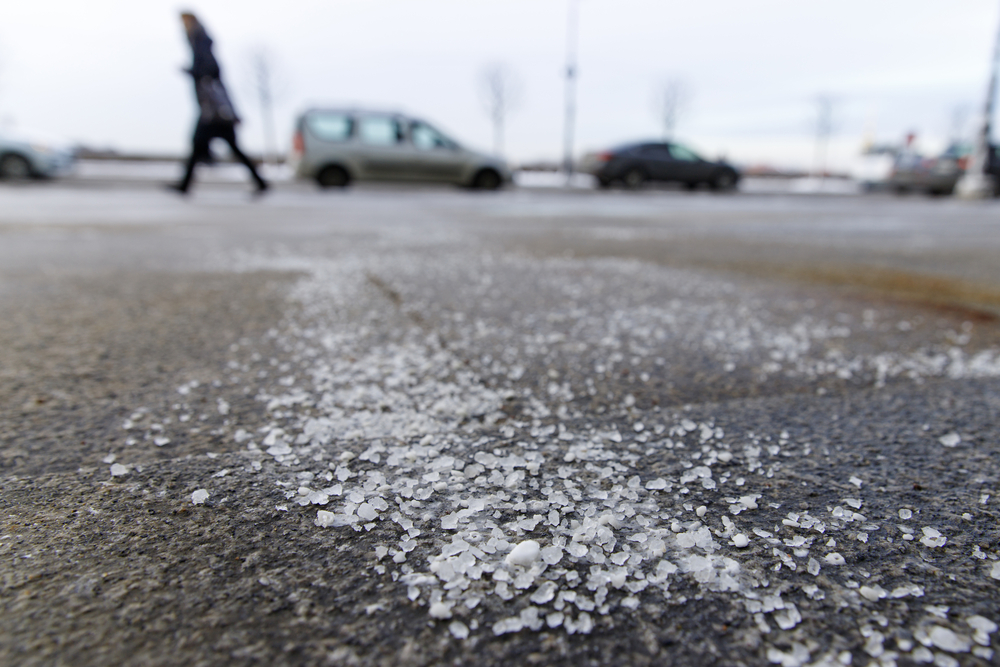As the temperatures begin to inch ever closer to freezing it’s natural to consider how best to avoid the dangers of a slippery asphalt driveway. Snow and ice on the surface can increase the risk of slips and falls for pedestrians, as well as making driving more risky.
While there are a variety of ways to avoid such situations, possibly the most popular (and most practical) option is road salt.
While we all know that salt is effective in icy conditions, a common concern among those of us with asphalt paths or driveways is whether salt can be damaging. After all, little point in avoiding a few days of slips if you’re going to have to replace the driveway come springtime.
Does Salt Hurt a New Asphalt Driveway?
Contents

Salt is safe to use on asphalt when properly applied. While historically many homeowners were advised against using salt on their asphalt driveway, the reality is that these days we know that modern asphalt is not harmed by de-icing salt.
Why Do Some People Say Salt Shouldn’t Be Used?
While salt is perfectly safe to use on a properly cared-for asphalt driveway, it can cause issues on asphalt driveways that are already damaged.
In cases where asphalt is already cracked, salt can speed up the deterioration of the surface. This happens when the salty water enters the existing cracks. As water freezes and thaws it expands and contracts. This can destabilize asphalt when it happens below the surface.
Saline water tends to freeze and thaw more frequently, so the deterioration happens that much quicker.
The key is to repair any cracks in late summer or fall, before the winter rain and snow begins. In that way you know you’re safe to use salt on your asphalt driveway whenever the need arises.
How Does Salt Prevent Ice on My Driveway?
The use of salt to prevent ice and snow is quite simple. When the water that makes up the ice or snow touches the salt, the fresh water becomes salty.
Salt water has a far lower freezing point, so it prevents the moisture from becoming ice.
It is the same reason why the ocean so rarely freezes, even when there is thick snow or ice on land nearby.
Some homeowners opt to combine road salt with coarse sand, primarily because salt is reasonably expensive. Mixing it with sand helps it to go further.
However the coarseness of the sand can also help to keep freezing to a minimum. On a microscopic level, sand grains are sharp and abrasive. As you walk or drive over it, not only does it give your boots and tires more traction, but it can also help to grind any ice away from the surface of your driveway.
How to Apply Salt to Your Asphalt Driveway
Applying salt to an asphalt driveway is pretty simple.
There are really only three factors to consider.
Firstly, it’s important to salt your driveway before the freezing conditions arrive. Keep an eye on local weather forecasts and when you see the temperature heading down to freezing, get out with the salt. While salting after ice or snow has formed will still provide some benefit, it is far less effective than applying it before the freeze.
Secondly, note the recommended coverage on the bag. Try to follow these guidelines for best results, so you’re not wasting de-icing salt by over-applying it, or not adding enough.
Thirdly, spreading salt is not a particularly enjoyable job for a number of reasons, so it pays to get prepared for salt spreading. Salt is heavy, so spreading it manually can be back-breaking work. Salt is also corrosive and can damage clothing and footwear.
The solution is to dress up in clothes you won’t worry about. Study wellington boots work well as footwear, for example.
And even more importantly, invest in a salt spreader. While it may seem like a waste of money, trust me that your back will thank you for years to come. Suddenly salting becomes almost a pleasant job, quite at odds with the pain and sweat of trying to spread salt using just a shovel.
Can You Use Table Salt on Your Driveway?
Table salt can be used on asphalt driveways. Chemically, it is exactly the same as the big bags of salt purchased from hardware stores to use on driveways. The only real downside is that table salt costs far more. So while it can be used in an emergency, it is more cost-effective to invest in a few bags of proper de-icing salt.
What Are the Downsides To Using Salt On an Asphalt Driveway?
You might be surprised to hear that not everyone uses de-icing salt on their asphalt driveway.
This is because there are a few major drawbacks you might not be aware of.
Firstly, the salty liquid produced when rock salt and ice combine can be detrimental to the environment. There have been cases of lawns, shrubs and prize trees being damaged by suddenly being deluged with saline water in large enough volumes. The less fussy you are about your front yard, or the fewer plants you have there, the less of a concern this will be.
Secondly, salty water rapidly corrodes metal. This is why cars tend to rust quicker in coastal areas, as the salty air speeds their demise. If you drive a new, expensive car, you may therefore want to avoid the use of salt on your driveway.
Conclusion
While salt does have a few potential downsides, it is so effective and has so few alternatives, that many homeowners opt to use it through the winter anyway. The good news is that salt won’t damage asphalt driveways, though this assumes your driveway is crack-free and otherwise in good condition. Just be mindful of the damage that salty water on your driveway can do to clothes, plants and vehicles before you decide if it’s the right solution for you.
